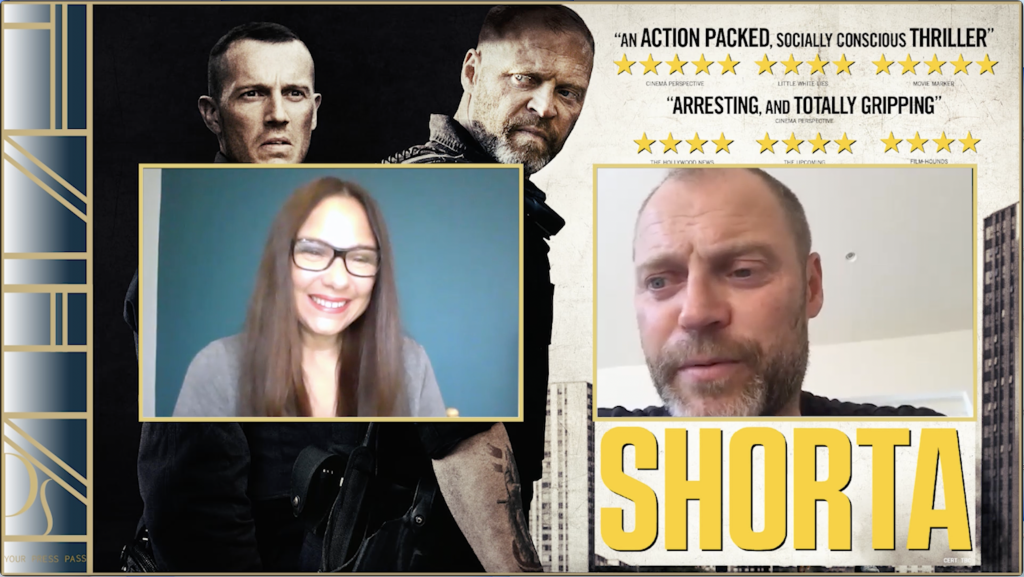
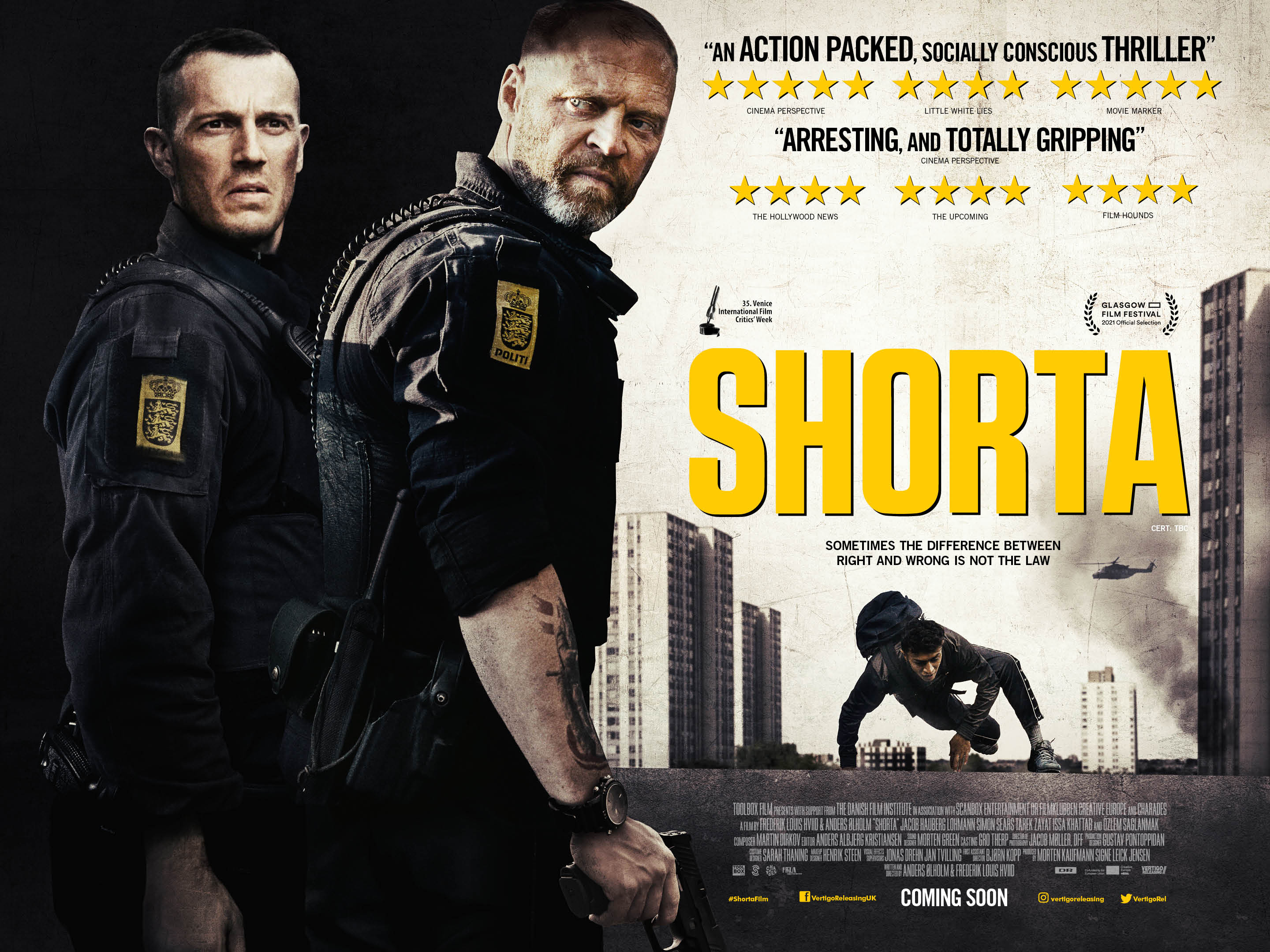
At A Glance
Directors Frederik Louis Hviid and Anders Ølholm astutely hold a mirror to society as two cops on a routine patrol become embroiled in a life threatening situation as racial tension amplifies.

Film Details
Directed by Frederik Louis Hviid, Anders Ølholm
Written by Frederik Louis Hviid, Anders Ølholm
Released by Vertigo Releasing
2021, 108 minutes, 15
Shorta - released in cinemas and digital now
Social Media: #SHORTA @VerigoRel
Cast
Jacob Lohmann as Mike Andersen
Simon Sears as Jens Høyer
Tarek Zayat as Amos Al-Shami
Anders (Ølholm) who are the directors and writers of the movie, and I wasn’t sure, for a long time I didn’t hear anything and then Frederik and I met up for another job for Danish television and he goes, “Yeah we got the money to make the movie!” and I’m like, “OK I didn’t know I was in the movie.” And he’s like, “What do you mean? What do you mean? Of course you’re in the movie!” “Well no one has told me so.” Because I figured they would have other people doing the workshop, they were casting around a little bit, which I then at a later date found out that they were (laughs) they actually had other people in there, but for some reason nobody ever told me that the part was mine. But we laughed about that, but Frederik, I think he had a miniature nervous breakdown ‘cause he was like, “You are available?!” And I was like, “Yeah, yeah, it’s alright.” (Laughs). It was fun, good stuff.
It really is and you are absolutely tremendous in it and with regards to Mike, and all the characters are multi-dimensional aren’t they? Mike he isn’t a good guy, he isn’t a bad guy, he is flawed so I thought maybe for you as an actor to portray a part that is so layered, must have been very exciting too?
Thank you. Yes it is. Like you said, you’ve basically said it all but I mean it’s a ..... He’s a product of his environment, that’s how I see it. And then through the movie he gets to show himself and the people around him, what he was like when he was Tarek’s age, Amos’ age. When he walks around in his room and he sees all of the soccer prizes, I think he is standing in his own room in some sense, when he was 14/15 maybe a little older. And when you read that in the script and you start doing the part that’s a great thing to have ‘cause then you know you can portray him as vicious and broken in the beginning as you want to because you have that to fall back on later in the movie, you have that sequence to fall back on. That’s just a great cushion to have as an actor that you don’t have to compartmentalise certain areas of the part and maybe that’s the wrong description. But you can go full out, what a big racist he is, what his ego, his dominant male attitude and all that because you have that to fall back on, it’s just a great thing to have when you start working.
I’m a huge fan of Danish drama, it is unapologetic in the sense that it is prepared to say things as they are and I feel with this film holds a mirror up to say there is racism in Denmark as there is sadly in many countries and by holding that mirror up and saying this is what’s happening in our country then it starts a discussion and hopefully things can start to change. Is that something as well that you find was interesting?
Yeah, in our case as well this is the future to come if we are not careful. I mean we don’t have as big a problem as they do in the states and whole ... obviously you see with the whole George Floyd thing; that happened after we made our movie which is just crazy ‘cause it’s just like, we did that scene almost like it was in the script. So this was a dark future to come if we are not careful, or so I thought at least. Because we are out there shooting a movie and just by being actors in a police uniform with our short haircuts and we had so many people yelling at us, during the shoot. It freaked me out, I was so surprised that there is this anger towards the police because that’s what it was. We didn’t even have time to explain to them that we are shooting a movie, they were just riding passed on mopeds and yelling at us and giving us the finger and saying. “Now you are coming here to portray a bad image of us again and we didn’t even get to talk to them, so of course it fuelled the atmosphere of the movie, but it didn’t give me a positive sense of where we are as a nation in this.
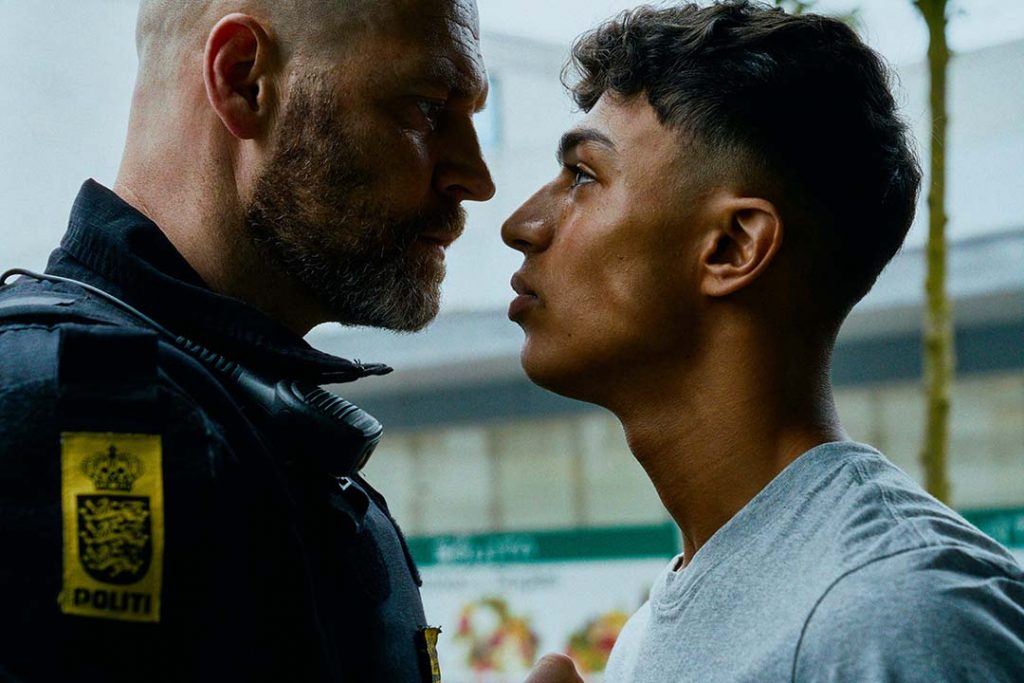
Interestingly enough I had the pleasure of interviewing Tarek the other day. And I hadn’t realised that from the casting process for him, he was kind plucked out of obscurity and he is a guy that lives within those kinds of estates. So I wonder whether for you and Simon acting and reacting against somebody who for him is quite raw because that’s the world he lives in. How did that help inform both of you as well?
Well, we could ask him about certain environmental moods where he grew up. But he’s a smart kid, Tarek is a smart kid and he’s studying law and he wants to be a lawyer, and I mean he doesn’t represent the kids that are having these anger issues at those areas where he lives, but he’s seen it and he knows it, so he was good at describing the problem and scenario whenever we were. So he was our little inspirational banks so to speak and I hope the best for him. I think he has great future ahead of him and even if he wants to act also I think he is doing great in the movie. But it was weird to see him evolve through this process, ‘cause he started out as nervous, you know? Of course because he has never been in this business before and then he was; he grew half a meter just by doing this project and I remember him being so scared when he realised he’s got to talk to the press and now I can hear that he’s been talking fine to you, so that’s good.
Because we so many facets to Mike’s personality with regards to your preparation are you an actor that listens to certain kinds of music to get you in the right head space? How do you prepare?
It’s funny you ask this. I used to when I just finished acting school and was young I did a lot of things to prepare for whatever, I read a lot of backstory and I made up my own back story about the parts, and I listened to music and I meditated and all that stuff. Then I realised that for me at least it’s a lot of wasted powder, because when you come to the set everything is not what you expected to be, so I find in much easier to be prepared for the whole story, of course and be prepared for what the part is about and where does it start, and where does it go, and have an idea about that, and usually you have a lot of meetings with the directors. Be as prepared but at the same time be as loose as you can when you show up to set, because you never know what the buildings look like, or what the pavements look like, or what the uniforms look like, or what the bad guy shooting at looks like, or whatever the setup, you don’t know. And if you have too many made up ideas, you can use your energy to default all those ideas that you came up with. Not to say that you show up like a blank page that’s not what I am saying at all, I have tons of ideas when I come to set, but its ideas, it’s not things that I have decided for myself, this is what the part is about and he’s like this, and he’s like this. ‘Cause I have sat in a lot of discussions with directors where I have tried to like pull it back to my own perception of what it was and if you ask me now I think being an actor is .. You are the extended thought of the director’s mind. And I know I have colleagues that don’t necessarily agree with me on this, but that’s what works for me. My job is to fulfil the director’s vision, and I can’t do that if I sit too heavy on my own chair of ideas, you know what I mean.
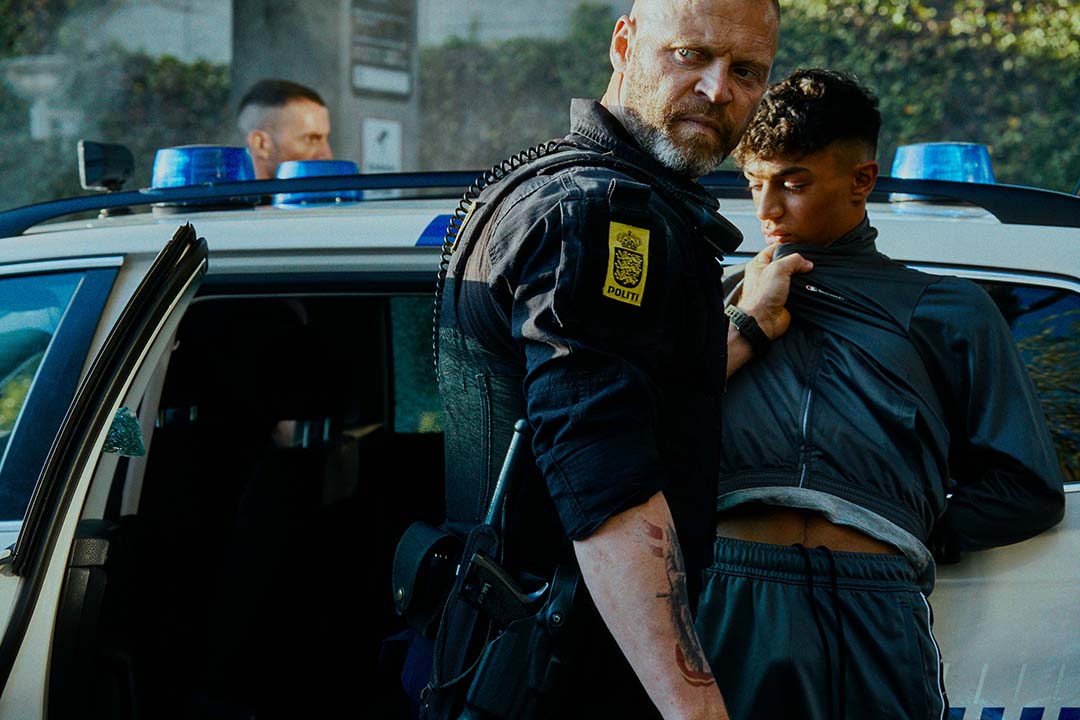
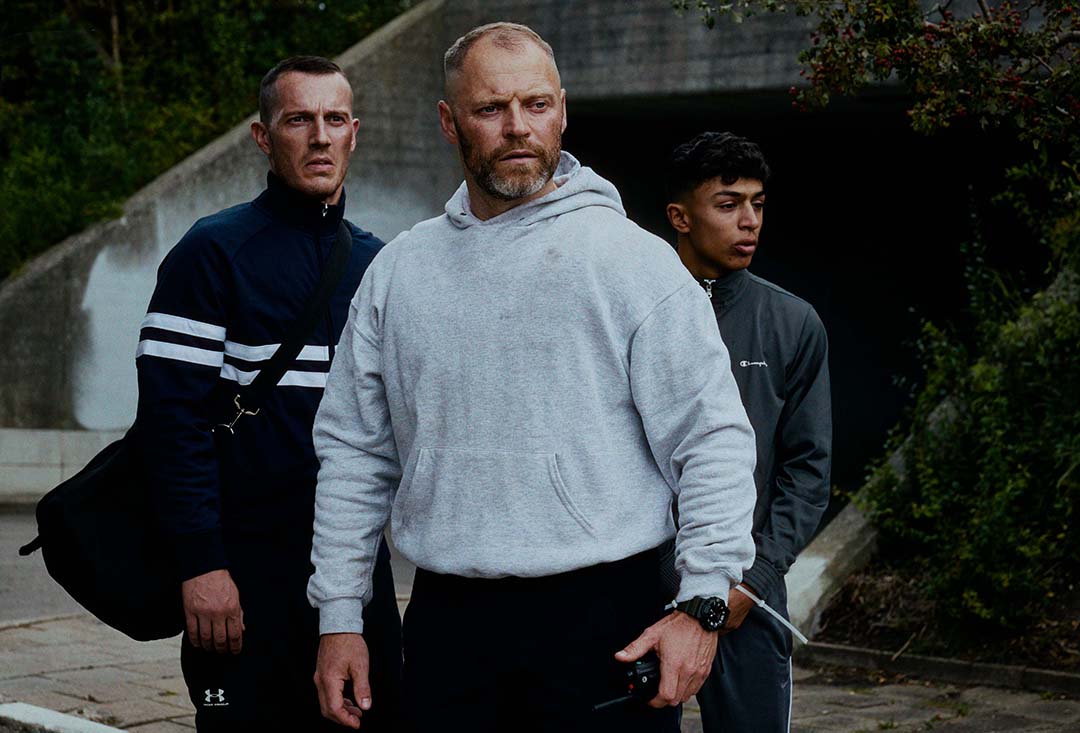
“If you ask me now I think being an actor is .. You are the extended thought of the director’s mind."
Shorta - Official Trailer
Claire Bueno
Claire Bueno is a film journalist, presenter and interviewer, having moderated BAFTA, Royal Television Society (RTS), Women in Film and Television (WFTV), and Apple Store Q&As and hosted Comic Con panel talks. Claire is the founder of Premiere Scene Magazine and has had the privilege of interviewing esteemed artists including Tom Cruise, George Clooney, Brad Pitt, Sir Anthony Hopkins, Sigourney Weaver, Emily Blunt, Samuel L Jackson, James Cameron and Andy Serkis.
As a media coach Claire works with leading personal publicists, HBO, Netflix, Sky, ITV, Penguin Random House, the BFI, DDA, MacMillan and Premier, offering practical coaching sessions and safe environment for talent to perfect their interview technique before facing the press. She has extensive experience working with emerging and seasoned professionals and where English is not their first language.
Additionally, Claire is the producer of the critically acclaimed feature documentary CLEANIN’ UP THE TOWN: Remembering Ghostbusters and the upcoming TOO HOT TO HANDLE: Remembering Ghostbusters II.